Gold Has Nowhere to Go but Up in 2025
from King World News
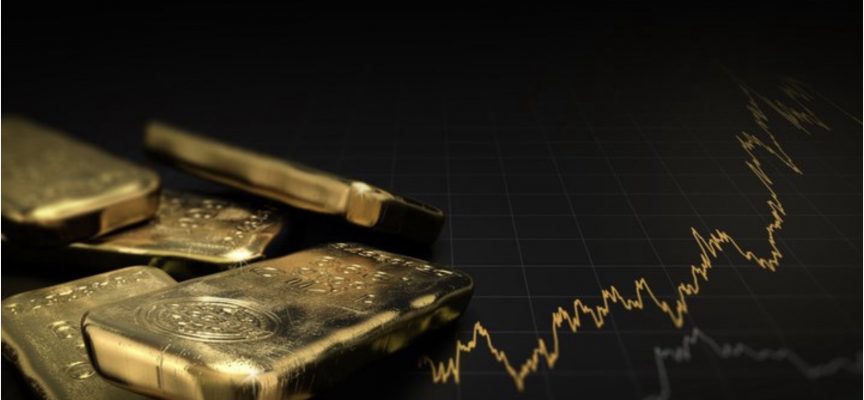 As we get ready to kickoff a new year, gold has nowhere to go but up in 2025.
As we get ready to kickoff a new year, gold has nowhere to go but up in 2025.
December 31 (King World News) – Matthew Piepenburg, partner at Matterhorn Asset Management: Another year is ending, which means it’s time to look back in order to better look forward.
For 2025, I see no other realistic option or scenario ahead other than a weaker dollar and rising gold.
This is not “selling my book,” it’s just a common-sense approach to the realities of history, debt markets and the signals of my often-repeated mantra that can’t be repeated enough, namely: “The bond market is the thing.”
Below, we see why.
Trump’s Crackpot Crypto Scheme to Reduce Inflation Would Be a Financial Catastrophe
A federal crypto reserve would only benefit the scoundrels and scammers who helped fund Trump’s presidential campaign.
by Chris Lehmann
The Nation
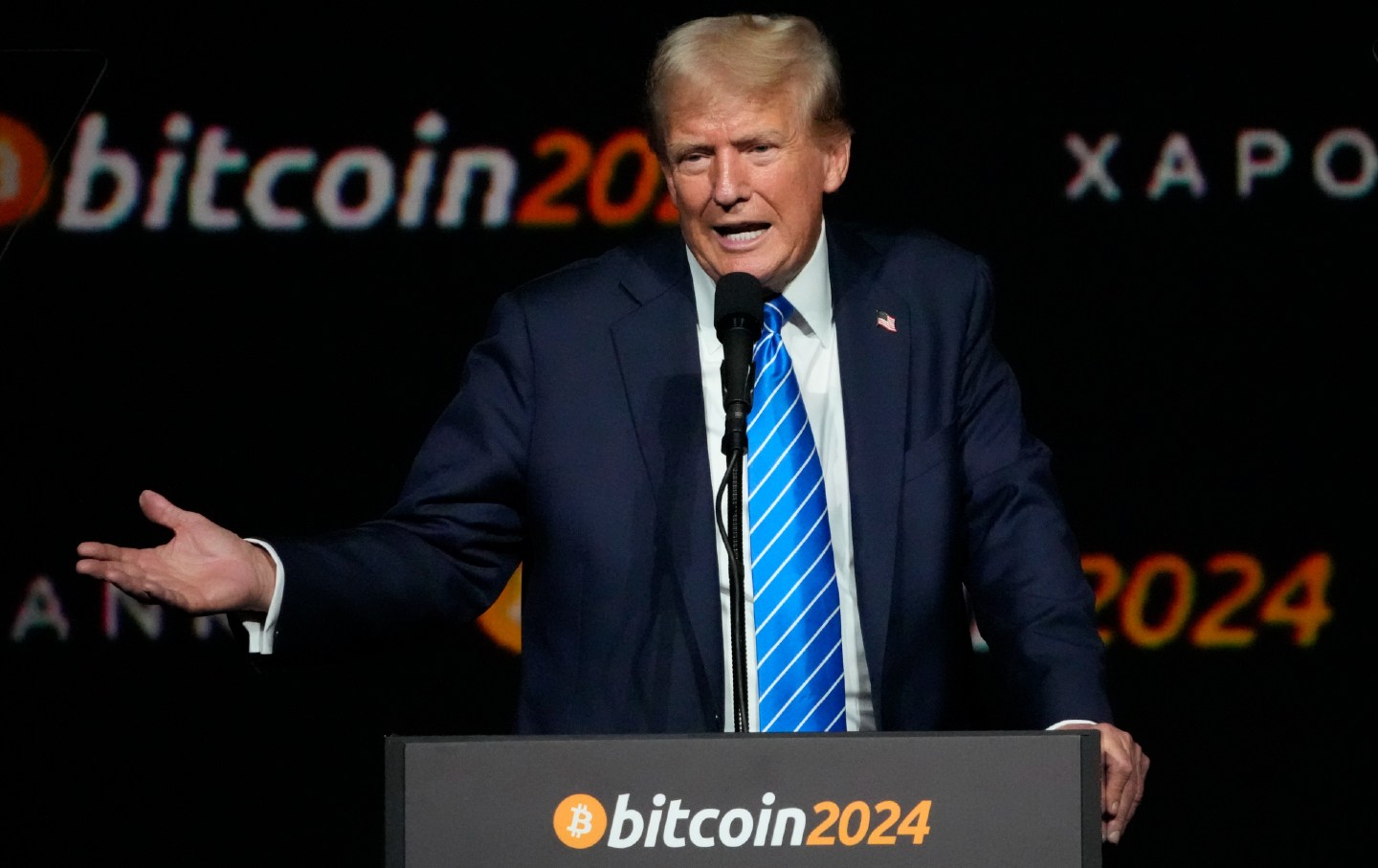 President-elect Donald Trump’s pledge to create a federal crypto reserve is a terrible idea. The most vivid proof was supplied by the crypto markets themselves, which saw Bitcoin prices rocket into six figures after Trump nominated a raft of crypto-boosters for the incoming administration and amid speculation that the federal government would soon hoard the data-mined tokens.
President-elect Donald Trump’s pledge to create a federal crypto reserve is a terrible idea. The most vivid proof was supplied by the crypto markets themselves, which saw Bitcoin prices rocket into six figures after Trump nominated a raft of crypto-boosters for the incoming administration and amid speculation that the federal government would soon hoard the data-mined tokens.
The theory behind a currency reserve is that it serves as a hedge against inflation. In this view of things, gains in the crypto market can help release pressure on prices in the real economy, since the government’s reserves would appreciate at rates faster than inflation. But to have the prices of an asset rally to unprecedented heights on the mere possibility that it may form part of the US Treasury’s holdings is a sign that it’s less a storehouse of durable value than a volatile plaything for speculators and scammers. Indeed, the extreme volatility of crypto is why it’s subject to persistent market manipulation of the sort made infamous by the now-jailed crypto baron Sam Bankman-Fried: When an asset creates no economic worth of its own, the volume traders who build markets around it must commandeer a vast infrastructure of smoke and mirrors to disguise the dirty secret of its complete inutility. This is also why, amid the pre-holiday fever of crypto-speculation, news broke that North Korean hackers had engineered a $308 million theft of holdings from crypto broker DMM Bitcoin this spring—a heist that forced the company to shut down earlier this month.
Economic Forecast for 2025 and Beyond: Growth with Continued Inflation
by Bill Conerly
Forbes
![]() The economic forecast for 2025 shows growth, but at a slower pace than 2024. Inflation will remain above the Federal Reserve’s target, with President-elect Trump’s policies limiting production while stimulating spending. The greatest risk is not a recession but limited production capability as immigration falls.
The economic forecast for 2025 shows growth, but at a slower pace than 2024. Inflation will remain above the Federal Reserve’s target, with President-elect Trump’s policies limiting production while stimulating spending. The greatest risk is not a recession but limited production capability as immigration falls.
Economic Momentum Entering 2025
The United States economy has grown nicely through 2024. The last two quarters in particular grew faster than the long-run average, and the Atlanta Federal Reserve’s GDPNow estimate for the fourth quarter continues the above-average trend. Employment grew every month this year (though we don’t yet have December 2024 data).
Inflation Stress and Concern Remain Elevated Despite Stabilizing Prices
by Anthony Murphy and Isha Parmar
Federal Reserve Bank of Dallas
 Despite consumer price inflation falling considerably since peaking in 2022, household inflation-related stress and concern remain elevated, having dropped only slightly.
Despite consumer price inflation falling considerably since peaking in 2022, household inflation-related stress and concern remain elevated, having dropped only slightly.
Although most economists and policymakers tend to focus on the decline in inflation (the change in prices), a large share of households—especially low-income households—remain focused on still-elevated prices and the resulting difficulties paying expenses.
More than four in 10 households (45 percent) reported feeling highly stressed by rising prices in third quarter 2024, little changed from 47 percent in third quarter 2022. The incidence of high concern about anticipated inflation in the upcoming six months remained elevated at 57 percent of households in third quarter 2024 compared with 61 percent in third quarter 2022.
U.S. Homelessness Hits New Record in 2024
by AFP
Breitbart.com
 The number of people in the United States experiencing homelessness reached a new record this year, with lingering inflation and high housing prices among likely drivers, a government report said Friday.
The number of people in the United States experiencing homelessness reached a new record this year, with lingering inflation and high housing prices among likely drivers, a government report said Friday.
An estimated 771,480 people were homeless on a single night in January 2024, rising 18 percent from 2023, said the Department of Housing and Urban Development (HUD) in an annual assessment.
This translates to about 23 in every 10,000 people in the country, home to the world’s biggest economy.
The uptick came as households felt the pressure from housing costs, with the median rent for January 2024 being 20 percent higher than that in January 2021, according to the National Low Income Housing Coalition.
Investors Wary of Inflation as Trump Pursues ‘America First’ Policy
by Shruthi Nair
AGBI
When Donald Trump returns to the White House his “America First” policy is likely to increase inflation and global economic fragmentation, according to analysts.
“We [the Middle East] need to be much more picky about particular geographies, asset classes and even themes that we favour,” said Ben Powell, chief investment strategist at BlackRock’s Investment Institute, speaking to AGBI at Abu Dhabi Finance Week.
Charted: Starbucks Price Inflation (2014-2024)
by Kayla Zhu
Visual Capitalist
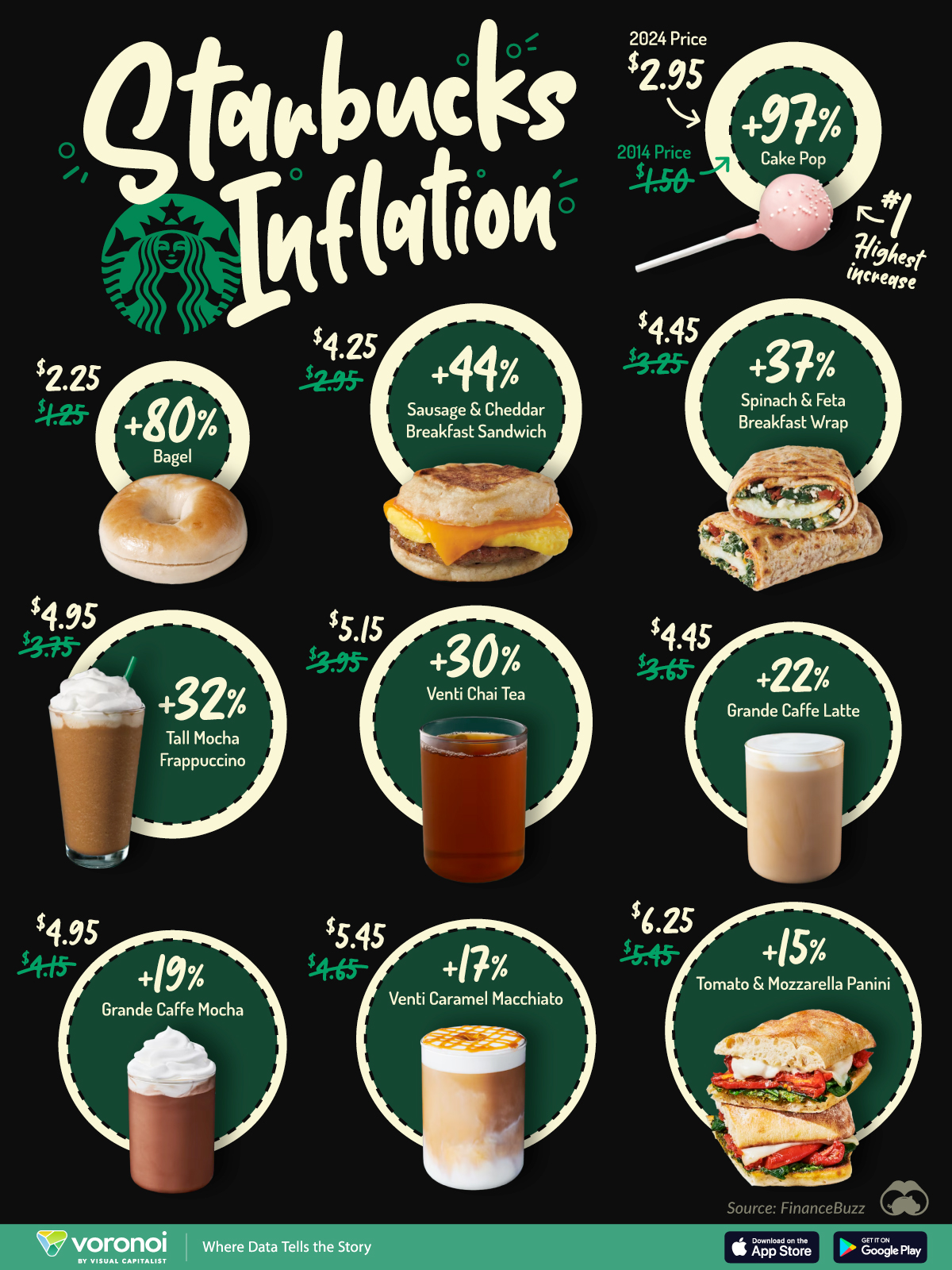 How Have Starbucks Prices Changed Since 2014?
How Have Starbucks Prices Changed Since 2014?
This was originally posted on our Voronoi app. Download the app for free on iOS or Android and discover incredible data-driven charts from a variety of trusted sources.
Once known for their affordability, fast food prices have climbed steadily over the years, making quick meals and sweet treats considerably less budget-friendly.
A prime example is Starbucks, where the cost of 10 popular menu items has seen a notable rise from 2014 to 2024, as highlighted in this visualization.
The data comes from Finance Buzz and was accessed in May 2024.
FinanceBuzz analyzed menu prices from 2014, 2019, and 2024 for 10 items available consistently across those years, sourcing data from menu price websites, restaurant official sites, and archived records via the Wayback Machine.
A Decade of McFlation
from Zero Hedge
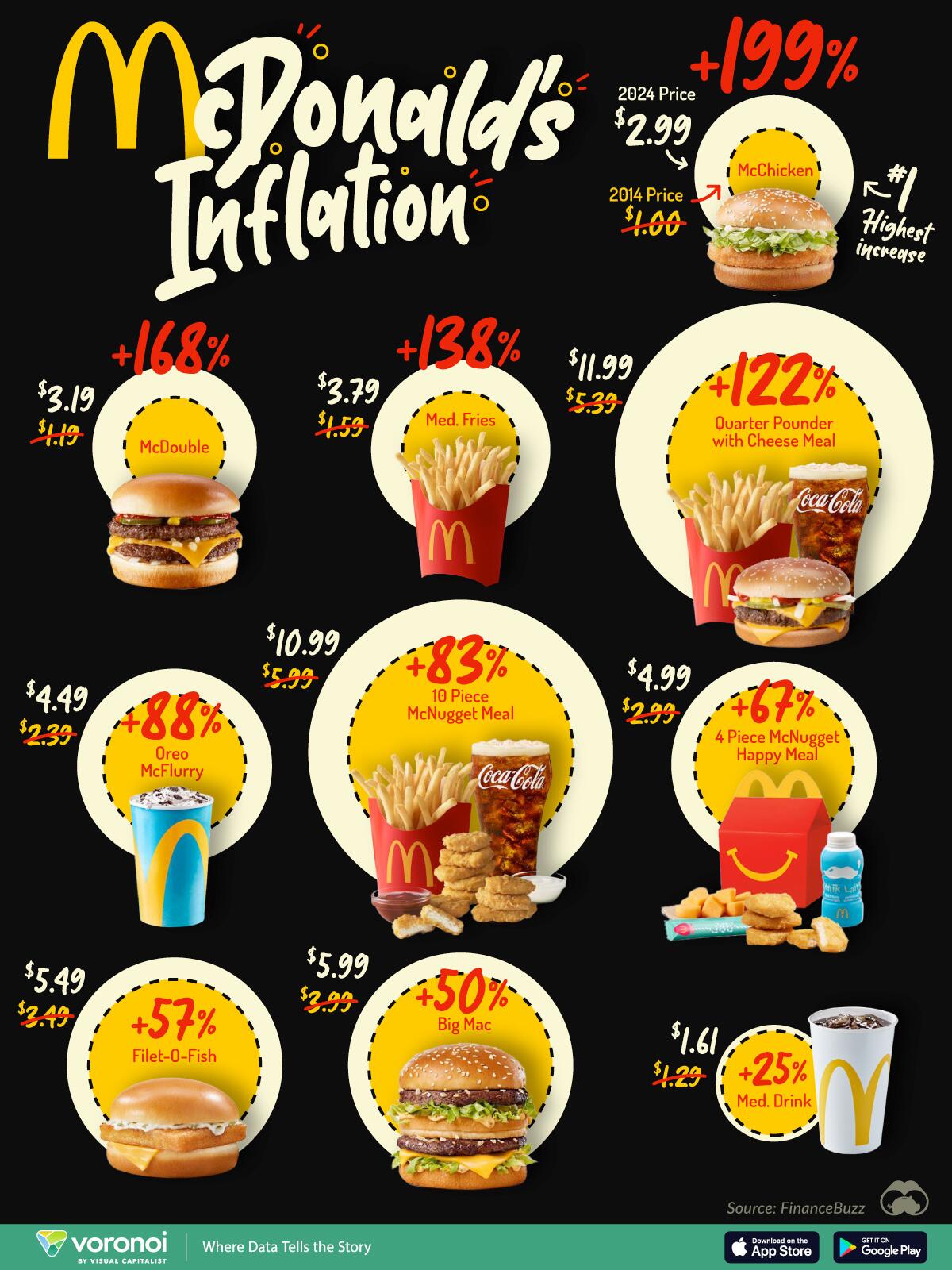
Fast food joints used to be the go-to choice for convenient, budget-friendly meals, but over the years, they’ve becoming increasingly tough on the wallet.
One major franchise that has seen substantial price hikes over the past decade is none other than the Golden Arches. This visualization, via Visual Capitalist’s Kayla Zhu, shows the price increase of 10 McDonald’s menu items from 2014 to 2024.
The data comes from Finance Buzz and was accessed in May 2024.
FinanceBuzz analyzed menu prices from 2014, 2019, and 2024 for 10 items available consistently across those years, sourcing data from menu price websites, restaurant official sites, and archived records via the Wayback Machine. Additional adjustments were made to account for franchise pricing variations.
The Real Inflation Number
by Byron King
Daily Reckoning
 What’s happening with inflation?
What’s happening with inflation?
Allegedly, it’s back down in the 3.5% range, give or take; and to do it right one must give and take quite a bit. That is, again, the government number jockeys shamelessly cook the books, as we see from reviewing a site like ShadowStats.com.
[…] If the government used the same methodology today as it used back in, say, 1980, we’d see a much higher rate of inflation. Instead of the advertised 3.5%, it might be more like 12%. And if you do things like buy a house, rent an apartment, buy a new car, pay insurance premiums, enjoy a top-shelf cut of meat from the grocery store, etc.?
Well, you know what I mean. There’s plenty of sticker shock out there, awaiting the unwary shopper. Still, prices for some things are stable, if not declining.
Make Cars (and Everything Else) Cheap Again
Plus: Superfund is back, Biden signs a lot of laws, MAGA vs. tech Christmas, and more…
by Peter Suderman
Reason.com
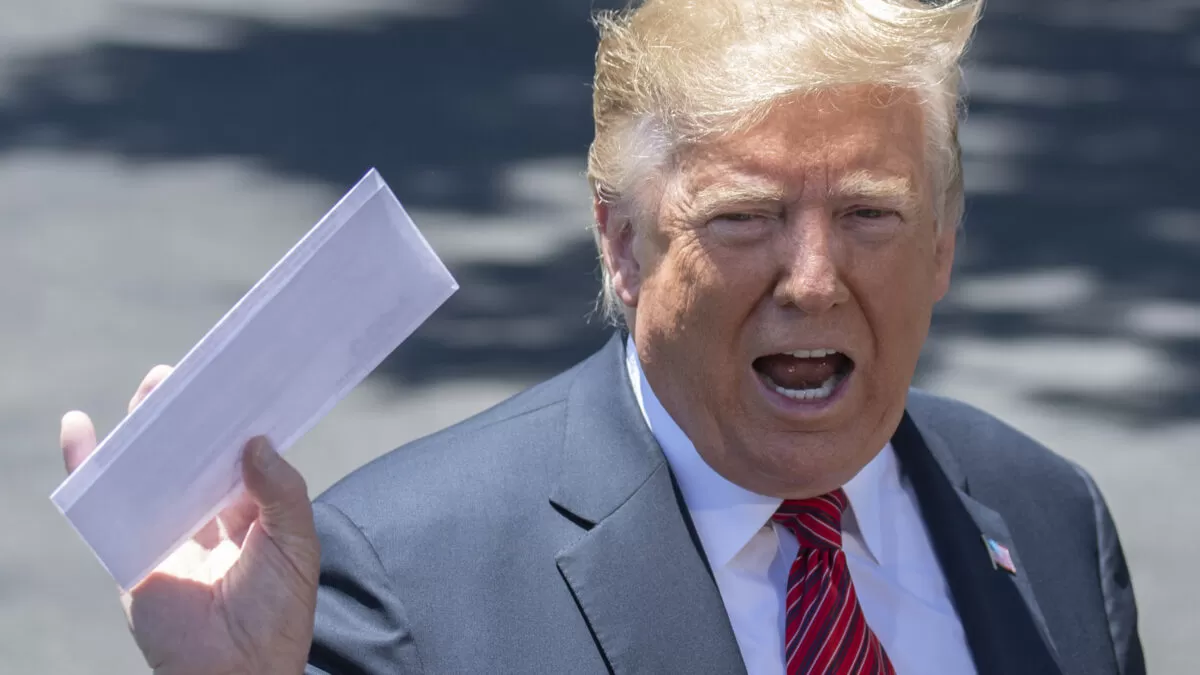 Tariff price shock absorbers: In 2019, the average price of a new car in America was less than $40,000. But in the years since the pandemic, prices of new vehicles have risen rapidly. As of October 2024, the average price of a new car was more than $47,000.
Tariff price shock absorbers: In 2019, the average price of a new car in America was less than $40,000. But in the years since the pandemic, prices of new vehicles have risen rapidly. As of October 2024, the average price of a new car was more than $47,000.
Incoming President Donald Trump’s threatened tariffs could raise those prices by nearly $3,000, according to an estimate from Wolfe Research, since the cost of tariffs is likely to be passed on to consumers.
That estimated price hike would be a direct result of Trump’s proposal to erect 25 percent tariffs on goods imported from Canada and Mexico. As The Wall Street Journal reports, the additional import taxes would hit low-priced vehicles especially hard, since many auto manufacturers have moved production of less expensive, low-profit-margin vehicles to Mexico.
